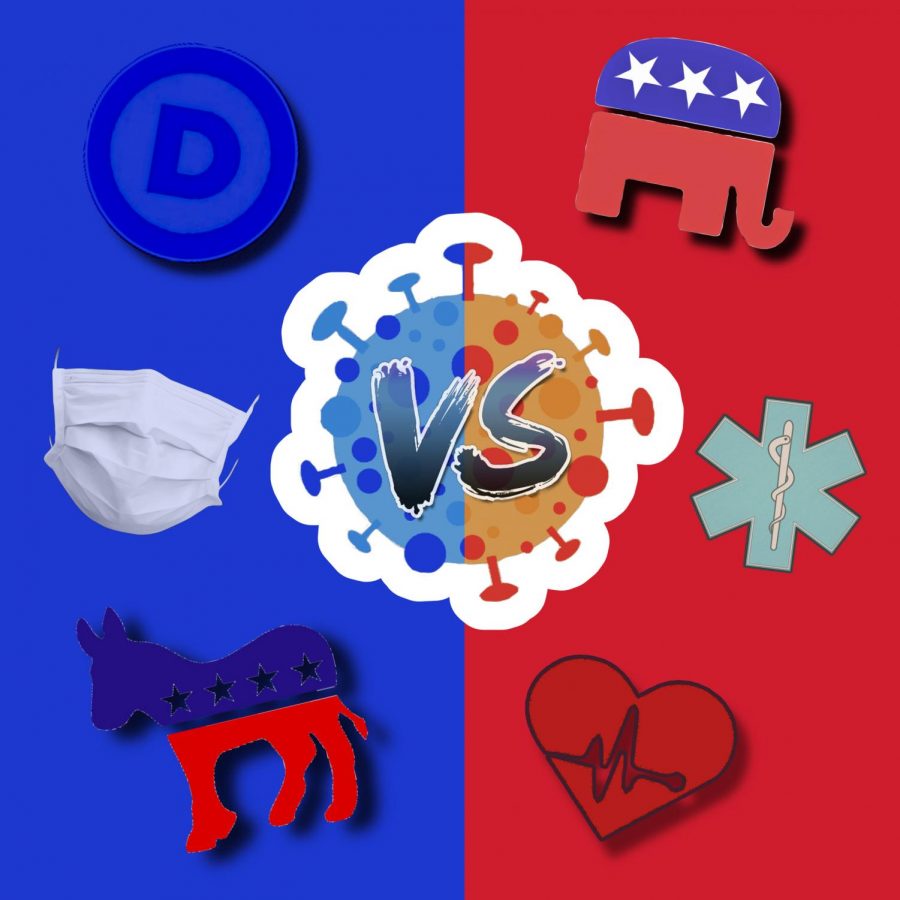2020 Election VS Coronavirus
Future of the 2020 Election uncertain with the Coronavirus
April 14, 2020
From school closures to social distancing orders, national lockdowns and overcrowded hospitals, the United States has already seen a tough start to the new decade. 2020 for some was supposed to be a historic year- and it still will be, however, for many unintended reasons. Gone goes the cheerful excitement of the Tokyo Olympics and the rallying around what may be the start of a new administration. That has been replaced with postponement, widespread panic, and isolation. It brings up an important question: What about the presidential election?
America’s political stage has been overshadowed by the growing public health crisis, the COVID-19 pandemic. Several states have postponed their primaries, examples being New York and Ohio.
Primaries are an essential part of the presidential election process. Primaries function like a general election, but instead of voting for the candidate directly they choose the number of delegates that each party’s national convention will receive from each state. Those delegates will then select the party’s presidential nominee at the party’s national convention. States can go about this in several ways, some may choose to only have primaries, while others may use them in conjunction with caucus, and others only using the latter. A caucus is a gathering of voters that choose which candidate to support, while primaries use ballots.
The Democratic National Convention was supposed to be held on July 13-16 however it was postponed until August due to concerns about the coronavirus. A candidate needs to gain at least 1,991 delegates to secure the party nomination however, the decision of who becomes the nominee will be simple for this convention. On April 8th, Bernie Sanders dropped out of the presidential race, leaving Joe Biden as the only candidate left, therefore he is the presumptive nominee.
“In our current climate of uncertainty, we believe the smartest approach is to take additional time to monitor how this situation unfolds so we can best position our party for a safe and successful convention. During this critical time, when the scope and scale of the pandemic and its impact remain unknown, we will continue to monitor the situation and follow the advice of health care professionals and emergency responders,” The CEO of the Democratic National Convention, Joe Solmonese said.
While the Democratic National Convention may have not found issues with their postponement, other events, such as Wisconsin’s democratic primary have found issues in trying to take the path of caution. The state’s primary took place on Tuesday, April 7th, after disagreements between the legislature and Governor Tony Evers.
“Folks, I can’t move this election or change the rules on my own. My hands are tied… That’s why I spoke to legislative leaders about this weeks ago. I even publicly called upon them to act. They have made it clear they are unwilling to make changes.” Evers said in a video on Facebook.
The Wisconsin legislature was hellbent on continuing with their primaries despite other states choosing the more cautious route and an expected record low voter turnout.
“The Wisconsin election will be like nothing anyone alive has ever experienced. Everyone involved in this election is scrambling to try to make a democracy work in an impossible situation.” Ben Wikler, the chairman of the Wisconsin Democratic Party stated.
Delayed primaries may not be the only issue facing the elections. Democrat’s gains in the house during the 2018 midterms were driven by higher voter turnout, which was expected to carry into the 2020 election. However, with health and safety taking precedent and states delaying their primaries left and right, this election might face historically low turnout.
“The consequences could shake the 2020 elections: Turnout had been expected to break modern records but instead could turn sharply downward, based on the path the coronavirus pandemic takes over the next few months.” POLITICO states.
A low voter turnout is not the only consequence of pandemic fears. For the past year candidates have been focused on issues like universal healthcare, climate change, and immigration. The coronavirus has changed that, gone are the debates about classic political issues and in comes a test of leadership for the parties nominees.
“You don’t blame the elected officials for causing the damage that the hurricane ravages across the state… You evaluate elected officials on how they handle the situation.” Republican pollster, Whit Ayres states.
This sheds light during the pandemic, American citizens have been given the chance to not only hear what their preferred candidate plan is but to see it in action.
“A lot of people, not just Democrats, are going to start looking to Mr. Biden and sizing him up. It’s a real-time test at some level. Even though he doesn’t have the authority, he can show and not tell what four years of a Biden presidency would feel like.” Manager of Senator Cory Booker’s presidential campaign, Addisu Demissie states.
Whether it be the primaries, the debate topics, or how candidates campaign the COVID-19 outbreak has impacted every corner of American politics. No matter how the election is impacted by the pandemic, it is important to follow the guidelines recommended by the CDC and the World Health Organization. For those looking to participate in voting and sharing your voice make sure to look into voting by mail, virtual campaign events, and online volunteering.
New York Governor Andrew Cuomo highlights this need, reminding the citizens of his state that no matter their political affiliation this virus is deadly and safety is a priority.
“There are no red states, there are no blue states. The virus doesn’t attack and kill red Americans or blue Americans, it kills all Americans. Keep that in mind.”



